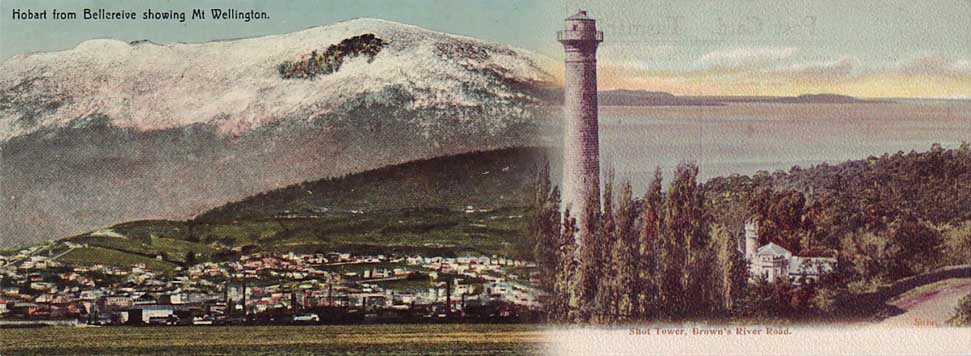THE HISTORY OF McVILLY AND LITTLE
McVilly & Little were retailers of “fancy goods” in Hobart from 1901 to 1937. They published a range of attractive, well-produced , mainly colour postcards of Tasmanian scenes. The cards themselves are fairly common, but we know almost nothing about the circumstances of their publication.
The Mercury of 1 February 1901 carried an advertisement announcing the opening of the McVilly & Little store:

Walter Frederick McVilly was born in 1868, and married Ellen Little in 1895. His business partner, Henry Edward Little, was his wife’s brother. Another of his wife’s brothers, W.J. Little, was also in the postcard business, but there is no mention of him being involved in the McVilly and Little business.
The McVilly & Little shop was initially at 125 Liverpool Street, on the northern side of the street a few doors up from Murray Street. In 1904 they moved a hundred metres down Liverpool Street to number 101, a few doors below Murray Street. But the street was re-numbered in 1908, and their number changed to 123, making it appear they had just moved next door! They advertised their shop as The Red Arcade; I haven’t seen a photograph, but presumably it was painted red.
From The Red Arcade they traded in what we would now call homewares. The opening advertisement lists crockery, glassware, cutlery, stationery, and basketware, but over the next 36 years it seems they advertised every item of household equipment that was available in the early 20th century. On 8 January 1902 it was dolls, toys and steel travelling trunks, the next week it was “a splendid assortment of ping pong balls”, and the next it was battledores and perfumery and portmanteaux. A newspaper note in 1906 gave a little insight into the proprietors: “Mr Walter McVilly of the firm McVilly and Little of Hobart, is one of the few really energetic businessmen at this end of the island, and a living example of the truism that:
The man who would win
Must practice a grin
And keep his face level by smiling.
The man who keeps cheerfulness always on tap is bound to succeed, while the man who grumbles gather no gear. …. Mac’s partner Mr Little is also a cheerful chap, but perhaps less aggressively mercurial than his mate”.
Over McVilly & Little’s 36 years in business, with at least weekly advertising in The Mercury, there was rarely mention of the Tasmanian view postcards for which they are remembered. They advertised and sold imported postcards; in 1906, comic postcards included “The Language of Vegetables” and “The husband and how to train it”, a pack of a dozen cards for two shillings. In 1906 they advertised “300 varieties” of Raphael Tuck cards, including “Beautiful English Actresses” and charming views and landscapes. In 1907 it was Little Sadie, “the remarkably clever child comedienne” at one shilling and twopence for the set of 12 cards. In 1905-1907 their advertisements prominently carried the line “THE POSTCARD PEOPLE”, suggesting that was the height of the postcard craze. Only in 1909 did their advertisement include a one line mention of “A basket of Tasmanian views, containing 12 varieties, 3d to 2/-“. In 1918 they were advertising “an exquisite and comprehensive assortment of pictorial postcards”, but these bore captions such as “To Dear Mother”, and “To my dear son on active service”, and were probably imported.
The McVilly & Little business closed in 1937, with the last clearance auction on 16 December that year. Both W.F. McVilly and H.E. Little died in 1944.
THE SERIES OF McVILLY AND LITTLE CARDS
|
Series |
Printer |
Date Published |
|
Series 69,000 |
C. G. Röder, Germany |
1905 |
|
Series 93,000 |
C. G. Röder, Germany |
1906 |
|
Series 99,000 |
C. G. Röder, Germany |
1906 |
|
Series 133,000 |
C. G. Röder, Germany |
1907 |
|
Impressed Series |
Emil Pinkau & Co, Germany |
1908 |
|
Numbered Series |
Emil Pinkau & Co, Germany |
Pre 1910 |
|
M & L Series |
Emil Pinkau & Co, Germany |
1910 |
|
McV & L Series |
Emil Pinkau & Co, Germany |
1911 or 1912 |
|
Subscript "a" Series |
Emil Pinkau & Co, Germany |
1914 |
|
Monochrome Series |
Unknown |
Unknown |
